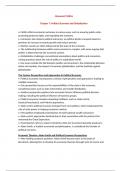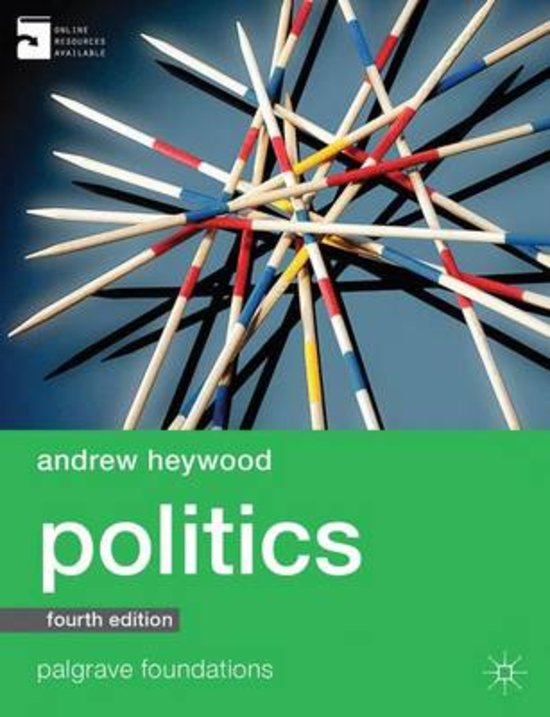Heywood, Politics
Chapter 7: Political Economy and Globalization
• Politics affects economic outcomes in various ways, such as ensuring public order,
protecting property rights, and regulating the economy.
• Economics also impacts political outcomes, as political parties compete based on
promises to increase economic growth and reduce poverty.
• Election results are often influenced by the state of the economy.
• The relationship between politics and economics is complex, with some arguing that
politics is determined by the economic system.
• Globalization challenges conventional assumptions about politics and economics,
raising questions about the role of politics in a globalized world.
• Key issues include the link between politics and economics, the relationship between
states and markets, the impact of economic globalization, and the backlash against
globalization.
The Various Perspectives and Approaches in Political Economy
• Political economy encompasses a variety of perspectives and approaches, leading to
multiple responses.
• One perspective focuses on the responsibilities of the state in the economy,
considering issues such as state intervention and wealth distribution.
• Another perspective explores how economic factors influence political decision-
making, including the political influence of business groups.
• Political economy includes competing traditions, such as state-centric,
classical/neoclassical, and Marxist approaches.
• State-centric political economy emerged from mercantilism, which emphasized the
role of state power in shaping economic markets.
• Mercantilism employed protectionism to build national wealth and power.
• State-centric approaches declined due to their association with the policies that
worsened the Great Depression.
• Protectionism refers to import restrictions that aim to protect domestic producers.
• Adam Smith, a Scottish economist and philosopher, is considered the founder of
political economy.
Economic Theories: Adam Smith and Political Economy Perspectives
• After holding academic positions, Adam Smith became tutor to the Duke of
Buccleuch, allowing him to develop his economic theories through visits to France and
, Geneva.
• Smith's book, The Theory of Moral Sentiments (1759), aimed to reconcile human self-
interest with an unregulated social order.
• The Wealth of Nations (1776) was Smith's famous work that explained the economy
through market terms and emphasized the importance of the division of labor.
• Classical political economy, based on the writings of Smith and Ricardo, assumes that
individuals are rational self-interested actors and that an unregulated market tends
toward equilibrium.
• Neoclassical political economy, developed in the late nineteenth century, built upon
classical ideas and focused on firm behavior and resource allocation in perfect
competition.
• Marxist political economy sees capitalism as class exploitation, with the bourgeoisie
as owners of productive wealth and the proletariat as exploited workers.
The Nature of Capitalism and Varieties of Economic Systems
• Capitalism is characterized by economic exploitation, where employers pay workers
less than the value of their labor.
• This exploitation is an essential feature of capitalism and leads to class conflict and
eventual instability.
• Surplus value is the value extracted from the proletariat's labor through capitalist
exploitation.
• Political economy examines how economic systems affect political and institutional
arrangements.
• Traditionally, economic systems were categorized as either capitalist or socialist, but
in reality, they were more complex and varied.
• The concept of a pure capitalist or socialist system is an illusion.
• The abandonment of central planning and market reforms have made capitalism the
dominant economic form globally.
• There are three types of capitalist systems in the modern world.
• Capitalism can be viewed as an economic system or an ideology.
• Its key features include private ownership of productive wealth, market organization,
wage labor, and profit maximization.
The Various Forms of Capitalism: Enterprise, Social, and State
• Enterprise capitalism (also known as 'liberal capitalism' or the 'American business
model') is seen as the purest form of capitalism, based on the principles of classical
economists such as Smith and Ricardo.
• Enterprise capitalism relies on market competition and places emphasis on high






